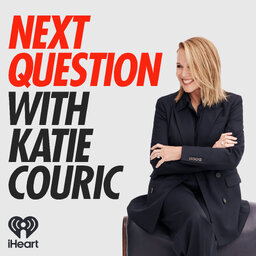Bonus: A spoiler-filled conversation with the cast and creators of 'The Handmaid's Tale'
It's Emmy season and on this bonus episode of Next Question with Katie Couric, Katie shares “The Handmaid's Tale” cast and creators panel she hosted for awards consideration. The dystopian Hulu drama just wrapped its dramatic, twist-heavy and pandemic-filmed fourth season, so be forewarned, there are spoilers ahead! There are so many talented people behind the ensemble show that the panel was split into two: the residents of Gilead and the refugees in Canada.
The episode begins in Gilead with, in order of appearance, executive producer and showrunner Bruce Miller, Joseph Fiennes (Commander Fred Waterford), Yvonne Strahovski (Serena Joy Waterford), executive producer, director and star Elizabeth Moss (June Osborne/Offred/Ofjoseph), Madeline Brewer (Janine Lindo/Ofwarren/Ofhoward), Ann Dowd (Aunt Lydia Clements), Bradley Whitford (Commander Joseph Lawrence), McKenna Grace (Esther Keyes), and Max Minghella (Commander Nick Blaine). In the second half of the episode, Katie talks with the refugees in Canada including executive producer Warren Littlefield, Bruce Miller, Elizabeth Moss, O.T. Fagbenle (Luke Bankole), Alexis Bledel (Dr. Emily Malek), Samira Wiley (Moira Strand), Sam Jaeger (Mark Tuello), and Amanda Brugel (Rita Blue).
This interview was organized by Hulu for its Television Academy FYC event for The Handmaid’s Tale. We are sharing a lightly edited version of the conversation.
Learn more about your ad-choices at https://www.iheartpodcastnetwork.com
 Next Question with Katie Couric
Next Question with Katie Couric


